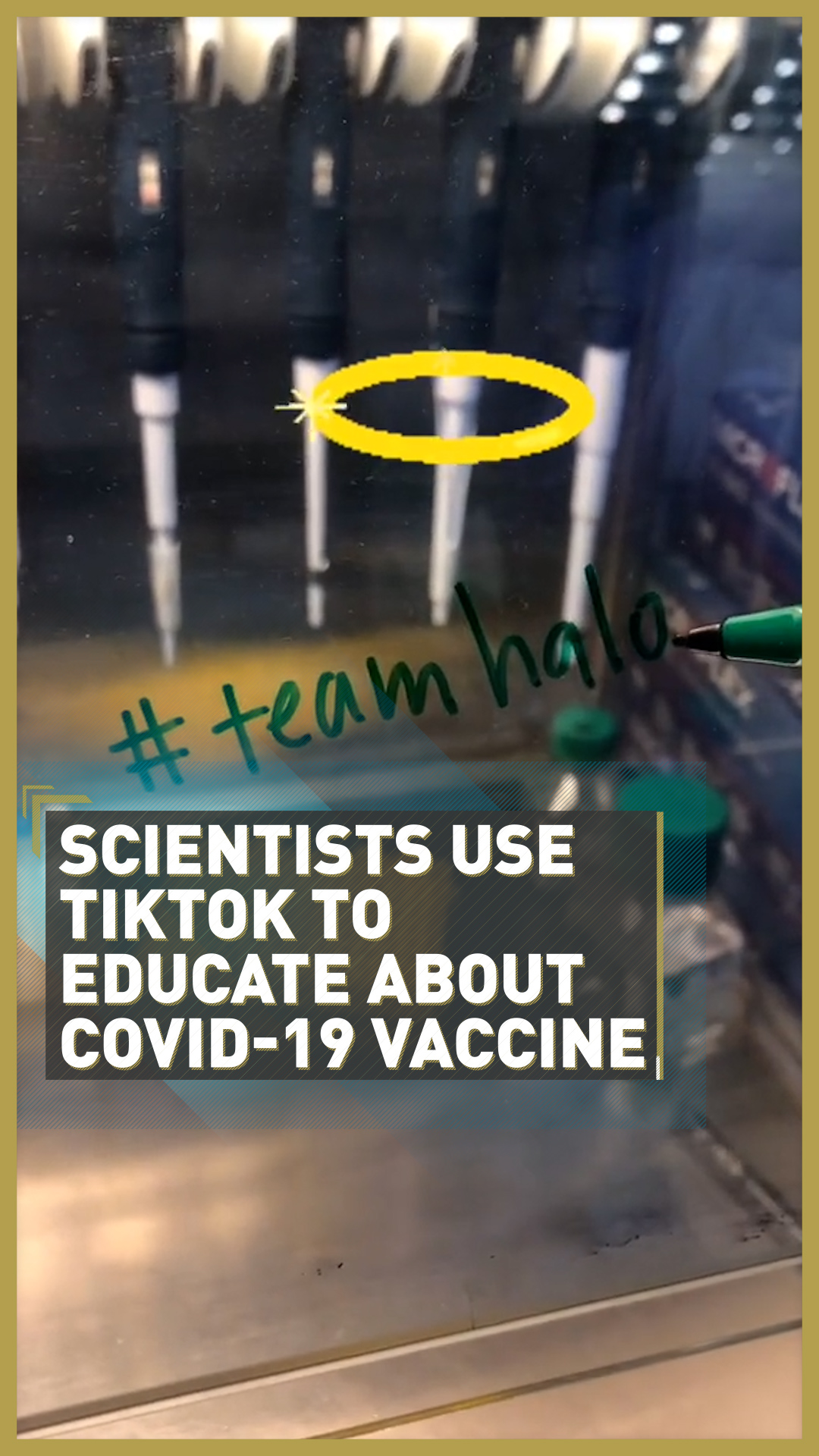03:47

A coronavirus vaccine has started to be rolled out in some countries but there is a lot of uncertainty surrounding it, not only due to disinformation on the internet but also due to many feeling as though they know little about what could potentially be injected into their bodies.
One group of scientists, know as Team Halo, are hoping to ease people's fears and provide them with clear scientific information about the coronavirus vaccine. The group of medical experts, from across the world, have taken to social media, mainly TikTok, to share simple and basic information in a factual yet fun way.
CGTN Europe spoke to Nathan Peiffer-Smadja, an infectious diseases consultant at the Bichat Hospital in Paris and Team Halo volunteer. He tells us first-hand why medical professionals across the globe decided to step forward and become a part of Team Halo.
"I work with Team Halo in France to encourage people to gain knowledge about the vaccines and to explain how vaccines work, to maybe fight against vaccine hesitancy," says Peiffer-Smadja.
Team Halo is supported by the United Nations (UN), which gathers experts with the hopes of easing vaccine fears and uncertainty.
Peiffer-Smadja explains that the main goal is be transparent in sharing information on the internet.
"If we explain things simply, people will believe in the vaccines and their fears will maybe not disappear but decrease. So the way we want to do it is to do it both in a scientific way, but with short videos."
With disinformation stoking worries about the vaccine, Peiffer-Smadja says that the main goal of Team Halo is to "tackle the fears of the people."
"The way we want to do it is to do it with simple and short videos so that people can watch it any time. Sometimes with a humorous tone but to share validated scientific information."
The infectious diseases consultant continues "the idea is more to disseminate information, medical and scientific information, to everybody so that they can have answers to their simple questions."

Team Halo's videos are across social media platforms including TikTok, Facebook and Twitter but Peiffer-Smadja explains that the group of medical volunteers also aim to reach older groups of people through different mediums.
"I think as experts in our own countries, we go really often in the media," he says, mentioning the television and newspapers.
"I do at least between 10 and 20 interviews a week on such classical or standard media, which is more focused, I think, to the older people."
Peiffer-Smadja adds: "I think TikTok, the good thing is that you really can target young people, adolescents, and so that's the way we want to use it."

Medical experts from across the world have volunteered to be a part of Team Halo in order to share scientific information about the vaccine. /Team Halo
Medical experts from across the world have volunteered to be a part of Team Halo in order to share scientific information about the vaccine. /Team Halo
One of the main causes of uncertainty is that the vaccine has been developed in a much shorter time frame. As Peiffer-Smadja explains, the reason that this was possible is because scientists "don't begin at the beginning."
"With COVID-19, we have all the pharmaceutical companies, all the research institutes, all the medical and scientific experts working on vaccines, going for the same objective.
"We have means that are put into the development of vaccines that have never been before for any vaccine. So you get quicker because there is a common set of knowledge that can be used by any person working on the vaccine."
Peiffer-Smadja also says that sharing information via scientific publications and the use of new technology have helped to accelerate the vaccine-making process.
"When you look at vaccine development, you saw that 30 years ago, it took 20 years to do a vaccine.
"Last time we developed new vaccines, the new vaccine took five years for Ebola and COVID-19 took less than one year... things are accelerating."
The infectious diseases consultant also says that coronaviruses are a good target for vaccines because the spike protein which is easily available and needed for the entry of the virus into the cells, does not mutate significantly and can be used relatively easy for the vaccine.
Moving on from how long the vaccine actually took to make, allergic reactions to the vaccine are another cause of concern for many people, which Peiffer-Smadja clears up, saying that in reality, it was two people in the UK who had "a severe history of allergic reactions" but who "did not need to be hospitalized."
Peiffer-Smadja continues: "You have to say what's happening, but you have to say it in a way that people don't get afraid.
"You have to remind them that if you don't have a history of severe allergic reactions, if you've been vaccinated before, there is no reason you will develop a severe allergic reaction... you always have to balance between the risk and benefits of the vaccine."
The period of vaccine development and allergic reactions are just some of the myths debunked by Team Halo, which has people from countries across the world sharing videos in all languages in order to reach everyone.
"The good thing is that Team Halo is international, so we can share with other experts, anywhere in the world, we can share the scientific information, we can agree on the main messages, we can discuss together, and then we can go to our own country."
Peiffer-Smadja summarizes by saying: "I think we tackle the fears with the only way that has potential, which is by sharing good scientific and easily understandable information."
Video editor: Sam Cordell

